Educating Psyche – IELTS Reading Answers
5 min read
Updated On
-
Copy link
Table of Contents

Limited-Time Offer : Access a FREE 10-Day IELTS Study Plan!
The IELTS Academic Reading: Cambridge Reading Sample; ‘Educating Psyche’ with answers. The post will discuss the answers to questions 27-40. The headline of the passage is ‘Educating Psyche’
Educating Psyche
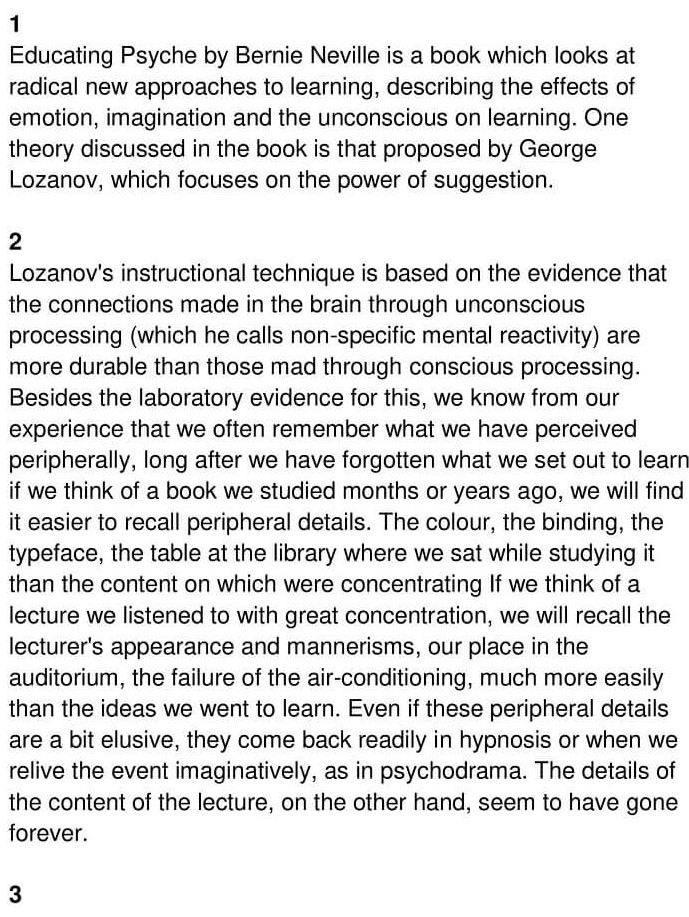
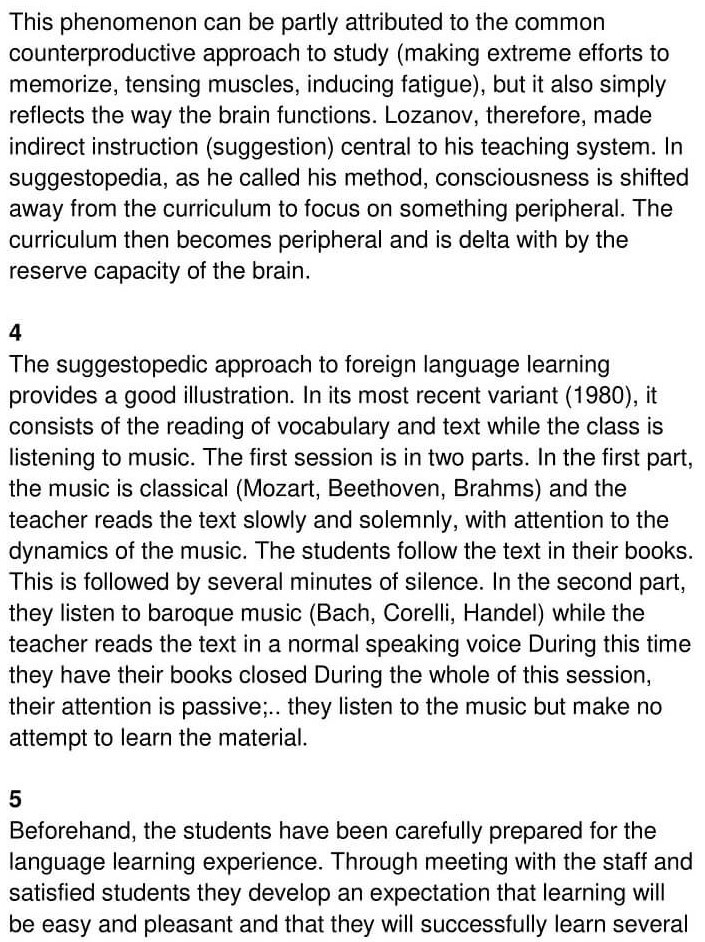
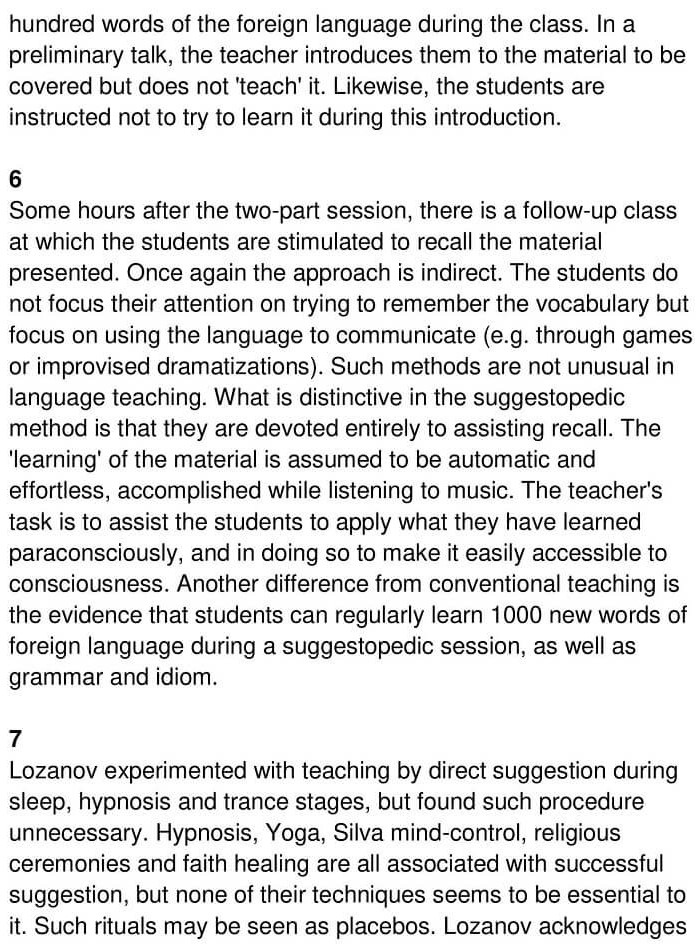
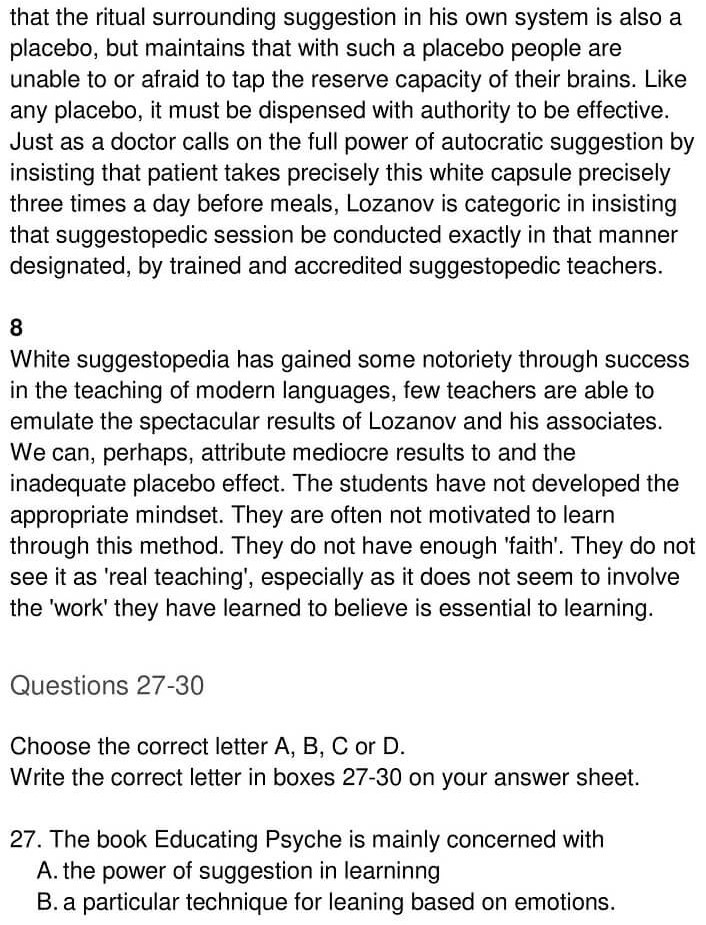
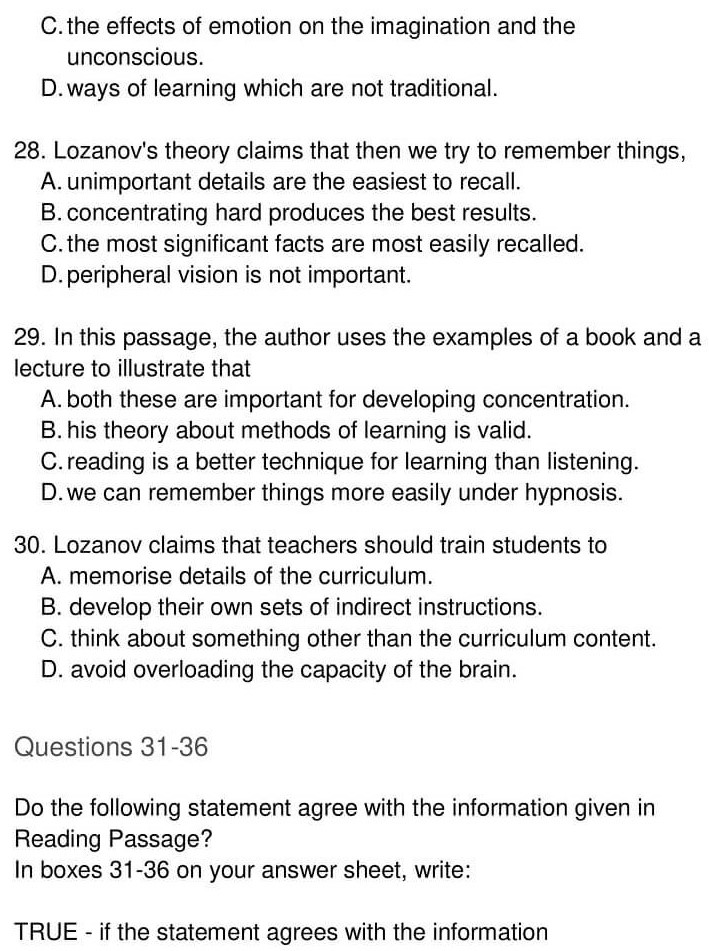
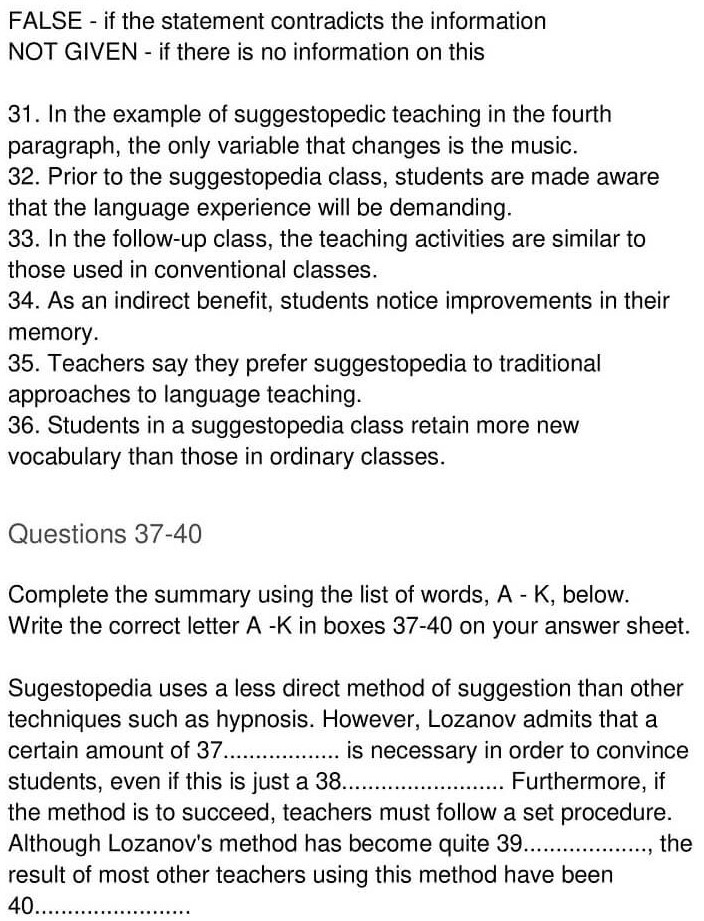
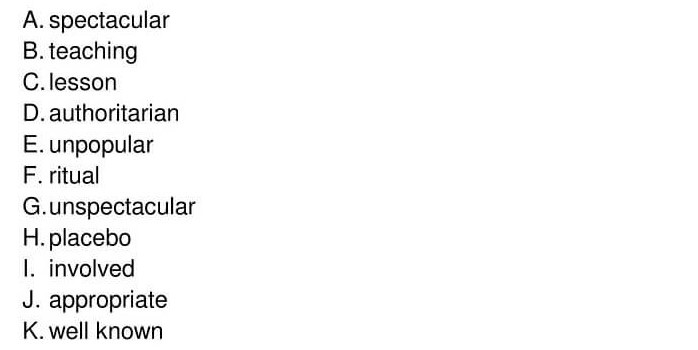
Answers
Unlock Answers
| Question Number | Answers | Explanation |
|---|---|---|
| 27. | D | Paragraph 1 states that ‘Educating Psyche by Bernie Neville’ is a book which ‘looks at’ (mainly concerned) ‘radical’ (not traditional) ‘new approaches’ (new ways) ‘to learning’, describing the effects of emotion, imagination and the unconscious on learning. Hence, the answer is D (ways of learning which are not traditional). |
| 28. | A | Paragraph 2 points out the fact that Lozanov’s ‘instructional technique’ (theory) is based on the evidence that the connections made in the brain through unconscious processing. Both ‘laboratory evidence’ and our experience proves that ‘we often remember’ (easiest to recall) what we have ‘perceived peripherally’, that is, unimportant details that we have kept at the edge of our consciousness. Hence, the answer is A (unimportant details are the easiest to recall). |
| 29. | B | Paragraph 2 mentioned if we think of ‘a book we studied months or years ago’, we will find it ‘easier to recall peripheral details’ (to remember the minor or unimportant details) like the colour, the binding, the typeface, the table at the library where we sat while studying it – than the content on which we were concentrating. If we ‘think of a lecture’ we listened to with great concentration, we will ‘recall the lecturer’s appearance and mannerisms, our place in the auditorium, the failure of the air-conditioning, much more easily’ than the ideas we went to learn. Both these examples prove Lozanov’s theory, that we recall unimportant details more easily, is valid. Hence, the answer is B (his theory about methods of learning is valid). |
| 30. | C | Paragraph 3 discusses that Lozanov made indirect instruction (suggestion) central to his ‘teaching system’, which involves teachers training students. In suggestopedia, as he called his method, ‘consciousness is shifted away from the curriculum’ to ‘focus on something peripheral’ (think about something other than the curriculum content which is important). This will make the curriculum peripheral or minor and will be dealt with by the reserve capacity of the brain so that it focuses on the curriculum more. Hence, the answer is C (think about something other than the curriculum content). |
| 31. | False | Paragraph 4 informs that in the ‘first part’ of the suggestopedic approach to foreign language learning, the ‘music is classical’ (Mozart, Beethoven, Brahms) and the ‘teacher reads the text slowly and solemnly’, with attention to the dynamics of the music. In the ‘second part’, they ‘listen to baroque music’ (Bach, Corelli, Handel) while the ‘teacher reads the text in a normal speaking voice’. During this time ‘they have their books closed’. So, there are changes in both the music and the reading pattern. As the statement contradicts the information, the answer is ‘FALSE’. |
| 32. | False | Paragraph 5 brings out the fact that ‘Beforehand’ (Prior to the suggestopedia class), the students have been carefully ‘prepared’ (made aware) ‘for the language learning experience’. Through meeting with the staff and satisfied students, ‘they develop the expectation that learning will be easy and pleasant’ and not demanding. As the statement contradicts the information, the answer is ‘FALSE’. |
| 33. | True | In paragraph 6, the writer tells us that after the two-part session of the suggestopedia class, there is a ‘follow-up class’ at which the students are stimulated to recall the material presented. Once again the approach is indirect. The students do not focus their attention on trying to remember the vocabulary, but focus on using the language to communicate (e.g. through games or improvised dramatisations). Such ‘methods’ (teaching activities) ‘are not unusual in language teaching’, that is, these methods are common or are similar to those in conventional classes. As the statement agrees with the information, the answer is ‘TRUE’. |
| 34. | Not Given | In the last sentence of paragraph 6, it is given that ‘Another difference from conventional teaching’ or an indirect benefit of the suggestopedia class is the evidence that ‘students can regularly learn 1000 new words of a foreign language’ during a suggestopedic session, as well as grammar and idiom. Other than this benefit of the suggestopedia class, there is no mention of any other benefit related to increase in memory. Hence, the answer is ‘NOT GIVEN’. |
| 35. | Not Given | In the first sentence of the final paragraph, the writer brings forth the fact that ‘suggestopedia has gained some notoriety through success’ in the teaching of modern languages, ‘few teachers are able to emulate the spectacular results of Lozanov’ and his associates. There is no further reference to the fact that teachers prefer suggestopedia to traditional approaches to language teaching. Hence,the answer is ‘NOT GIVEN’. |
| 36. | True | Paragraph 6 mentions that a difference between conventional teaching and suggestopedia class is the evidence that students can ‘regularly learn’ (retain) ‘1000 new words of a foreign language’ (more new vocabulary) ‘during a suggestopedic session’, as well as grammar and idiom. The mention of ‘difference from conventional teaching’ refers to the fact that the addition to vocabulary is more in suggestopedia class than ordinary classes.
As the statement agrees with the information, the answer is ‘TRUE’. |
| 37. | F | Paragraph 7 pointed out that Lozanov ‘acknowledges’ (admits) that the ‘ritual’ surrounding suggestion in his own system is also a placebo, but maintains that ‘people are unable or afraid to tap the reserve capacity of their brains’ and so these rituals are necessary in order to convince students. Hence, the answer is F (ritual). |
| 38. | H | Paragraph 7 lets out the fact that Lozanov ‘acknowledges’ (admits) that the ritual surrounding suggestion in his own system ‘is also a placebo’ required by people or students to tap the reserve capacity of their brains. Hence, the answer is H (placebo). |
| 39. | K | Paragraph 8 suggests that ‘suggestopedia’ (Lozanov’s method) has ‘gained some notoriety through success’ (has become well known as it has become successful) in the teaching of modern languages. Hence, the answer is K (well known). |
| 40. | G | In the beginning of paragraph 8, the writer specifies that while suggestopedia has gained some notoriety through success in the teaching of modern languages, ‘few teachers are able to emulate the spectacular results’ of Lozanov and his associates. We can, perhaps, ‘attribute mediocre results’ to an inadequate placebo effect. From these two references we can conclude that the results of most other teachers using this method have been unspectacular and mediocre. Hence, the answer is G (unspectacular). |
Check More IELTS Reading Answers
Also check :
Practice IELTS Reading based on question types

Start Preparing for IELTS: Get Your 10-Day Study Plan Today!
Recent Articles

Nehasri Ravishenbagam

Haniya Yashfeen

Haniya Yashfeen

Haniya Yashfeen
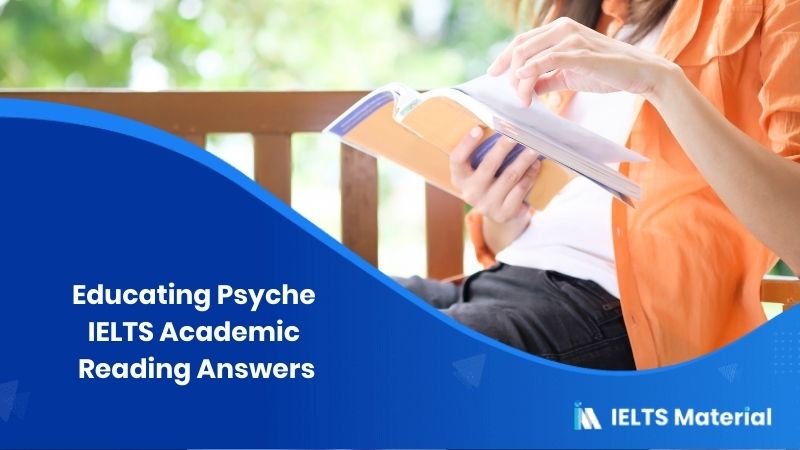



Post your Comments